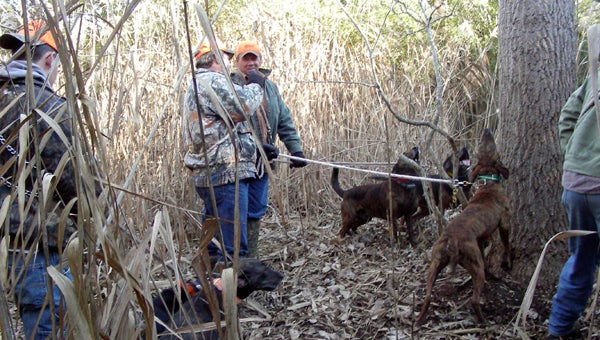New bear hunting regulations were long overdue
Published 11:03 am Tuesday, March 11, 2014
By Fred Bonner
Columnist
Several years ago, the Wildlife Resources Commission discovered that our Tar Heel black bear were becoming very overweight, and its teeth were rotting out. After discovering that some bear hunters were feeding (baiting) these animals with large amounts of items such as sugary pastries, chocolate, bubble gum and peanut butter, the commission decided to address the problem of hunters and bear watchers were literally feeding the bears to death. At that time, it was against the law to shoot a bear with the aid of any bait, defined as being anything edible.
On the other hand, it was legal to bait deer with just about anything you wanted to. Deer hunters piled sweet potatoes, shelled corn and peanuts under numerous deer stands in our state.
Somebody forgot to tell the bears that they were not allowed to feed on bait that was put out specifically for deer. Deer hunters faced a dilemma. If a bear came to eat the deer bait and the season for bear hunting was open, many of the deer hunters were going to illegally shoot the bear.
Hunters using dogs to hunt bear were not supposed to use bait to bring the animals to a spot where the dogs could easily pick up the scent of the bear, so the animal could be chased back to the hunters.
The NCWRC’s solution was to outlaw the feeding of bears with processed foods. Unprocessed foods, such as shelled corn, raw peanuts sunflowers, were okay to use.
They also adopted regulations that allowed the dog hunters to release the dogs over or near a pile of bait, but required them to not shoot the bear until near the bait site. Still hunters couldn’t shoot a bear over or with the aid of any bait. The bear hunters were confused at best by these regulations.
Some people felt that the solution to the bear baiting problem was to either make it illegal to bait any wild game animal, or to simply make it legal to bait any wild game animal.
Over the years the black bear population of our state was spreading from the coast and from the mountains toward the more heavily population urban areas. Black bears were invading such areas as Raleigh, Durham and even Charlotte. It was obviously necessary to open a bear season in some of these sections of N.C.
On Feb. 27, 2014, the N.C. Wildlife Resources Commission approved hunting regulations for 2014-15 that include establishment of a bear season in the Piedmont and allowing the aid or use of unprocessed foods for bear hunting on private lands, as long as the bear is not actually consuming the unprocessed foods.
The action came during the regularly scheduled Wildlife Commissioners’ meeting to consider wildlife management, game lands and fishing regulations for the 2014-15 seasons. The adopted fishing and hunting regulations will take effect Aug. 1, 2014.
The adopted bear hunting proposals will help maintain a healthy bear population in North Carolina, according to Dr. David Cobb, the Commission’s chief wildlife biologist. The recommendations were the direct result of the state’s bear management plan which utilizes science-based decision making, biologically sound management principles and public input to guide the decision process.
The Wildlife Commission held district public hearings in January and an open comment period that ended Feb. 14 on all conservation proposals. The Commission also held a series of regional public meetings in October 2013 to discuss the Black Bear Management Plan specifically, which included the possibility of creating a Piedmont bear hunting season.
The decision on the use or aid of unprocessed foods corrects a previous inequity between hunters with hounds and still hunters. In past seasons, bear hunters could release hounds at or near sites containing unprocessed food products, but still hunters were prohibited from taking a bear in an area containing bait.
For more information on North Carolina’s black bears and hunting regulations, as well as bear research and management, contact the North Carolina Wildlife Resources Commission at (919) 707-0186.






